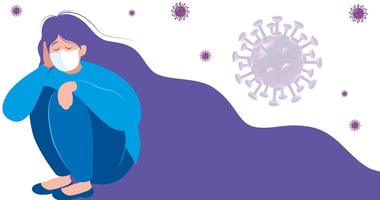Severe COVID-19 May Increase Risk of Mental Health Problems Months After Diagnosis

Adults who experience severe illness after contracting COVID-19 appear more likely to develop symptoms of depression, anxiety, and/or poor sleep in the months following their illness than adults without a COVID-19 diagnosis, reports a study published this week in The Lancet Public Health. The study—based on analysis of data from people living in six European countries and tracked for up to 16 months—also suggests that adults who experience mild COVID-19 symptoms may have a slightly lower risk of subsequent mental health problems compared with adults without a COVID-19 diagnosis.
The findings highlight the importance of continuing to closely monitor patients and conducting “follow-up studies beyond the first year among individuals with the most severe symptomology after COVID-19 infections,” wrote Ingibjörg Magnúsdóttir, M.Sc., of the University of Iceland; Anikó Lovik, Ph.D., of the Karolinska Institute in Sweden; and colleagues.
The study investigators compiled data from patient cohorts in Denmark, Estonia, Iceland, Norway, Sweden, and the United Kingdom. The data were collected between March 27, 2020, and August 13, 2021, and the study sample included 247,249 patients, including 9,979 with a COVID-19 diagnosis. Of the patients who had COVID-19, 31.6% had a mild illness (defined as never bedridden), 24.6% had a moderate illness (bedridden at home or in the hospital for one to six days), and 16.2% had severe illness (bedridden for seven or more days at home or in the hospital). There were no data on the severity of COVID-19 in 27.6% of the patients.
Overall, people diagnosed with COVID-19 of any severity had an 18% higher prevalence of depression symptoms and 13% higher prevalence of poor sleep within 16 months of diagnosis compared with individuals without a COVID-19 diagnosis; rates of anxiety symptoms were similar between the groups.
When focusing on the severity of illness, the investigators found that people with severe COVID-19 had a 61% higher prevalence of depression symptoms, 43% higher prevalence of anxiety symptoms, and 41% higher prevalence of poor sleep compared with people without a COVID-19 diagnosis. In contrast, people with mild COVID-19 had a 17% lower prevalence of depression symptoms and 23% lower prevalence of anxiety symptoms than those without a COVID-19 diagnosis.
“Several factors might contribute to this pattern,” Magnúsdóttir, Lovik, and colleagues wrote. “For example, individuals with a mild COVID-19 infection were able to return to somewhat more normal lives after the benign infection as compared with their more severely impacted counterparts who still could be restrained by fear of ongoing symptoms. Also, the extended duration of official gathering restrictions might have had less impact on the mental health of recovered asymptomatic COVID-19 patients than the general population. … It is also possible that individuals with a low risk of mental morbidities before the pandemic had a less severe disease course after being infected.”
To read more on this topic, see the Psychiatric News article “Expect a ‘Long Tail’ of Mental Health Effects From COVID-19.”
(Image: iStock/Stígur Már Karlsson /Heimsmyndir)
Don't miss out! To learn about newly posted articles in Psychiatric News, please sign up here.





